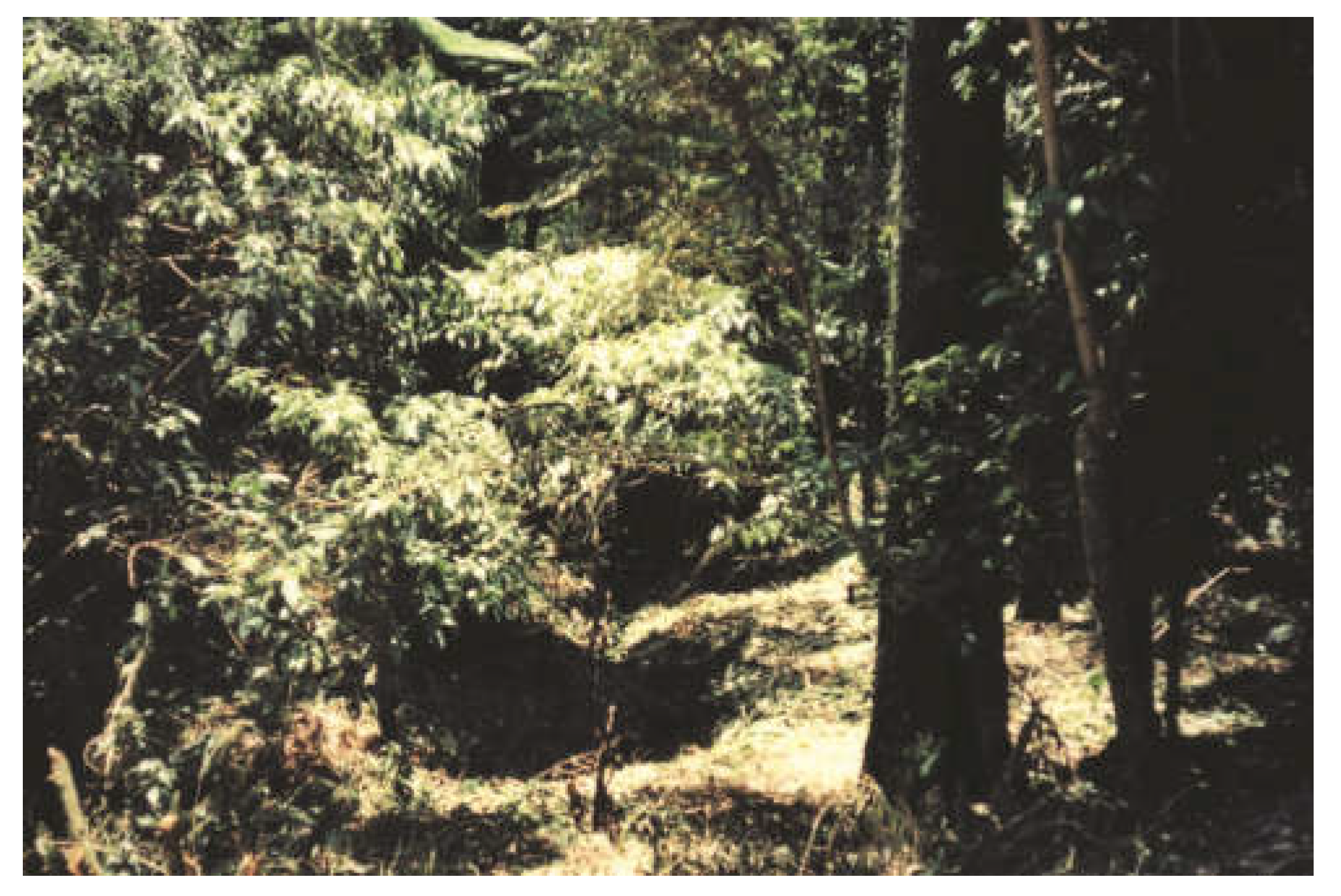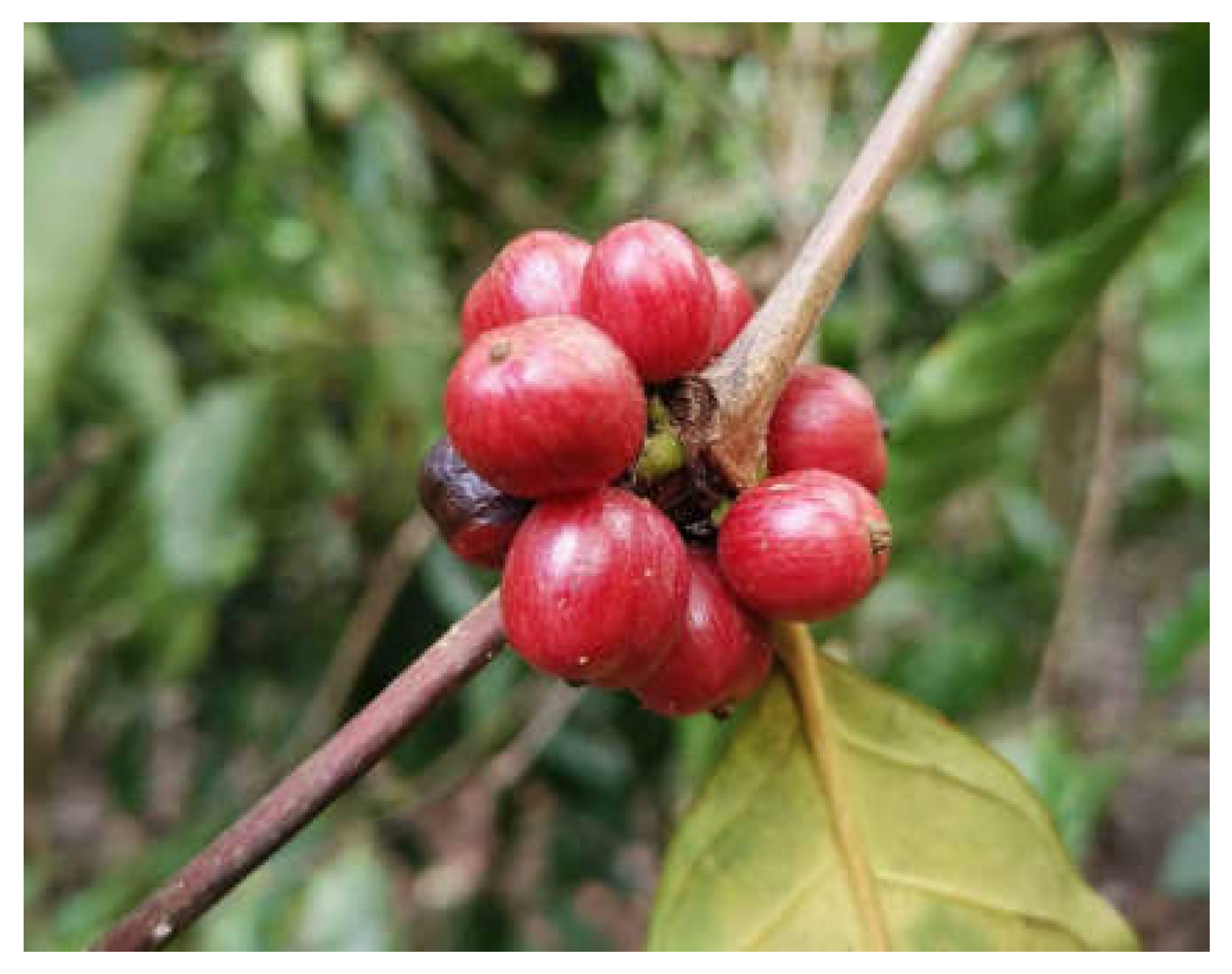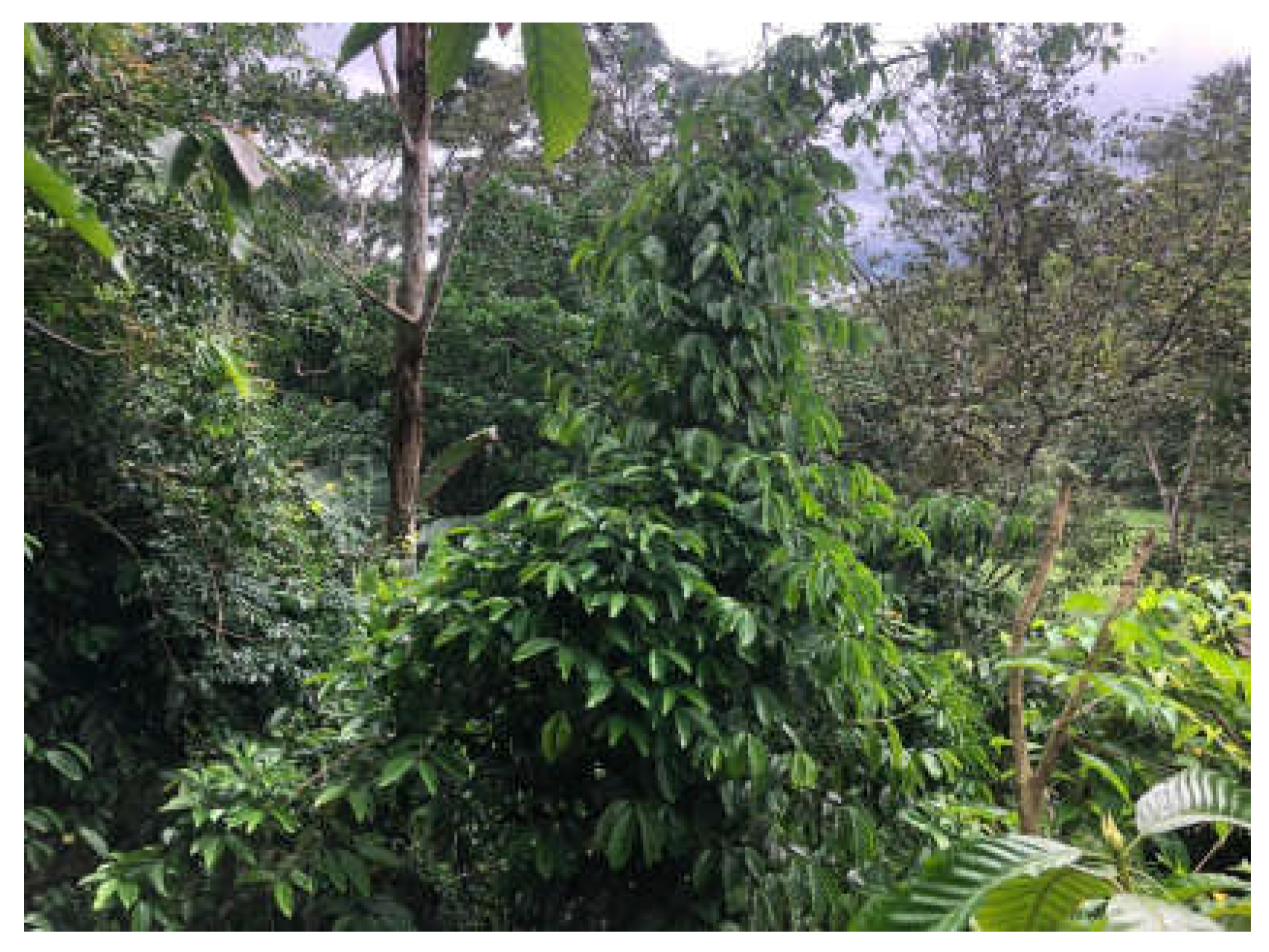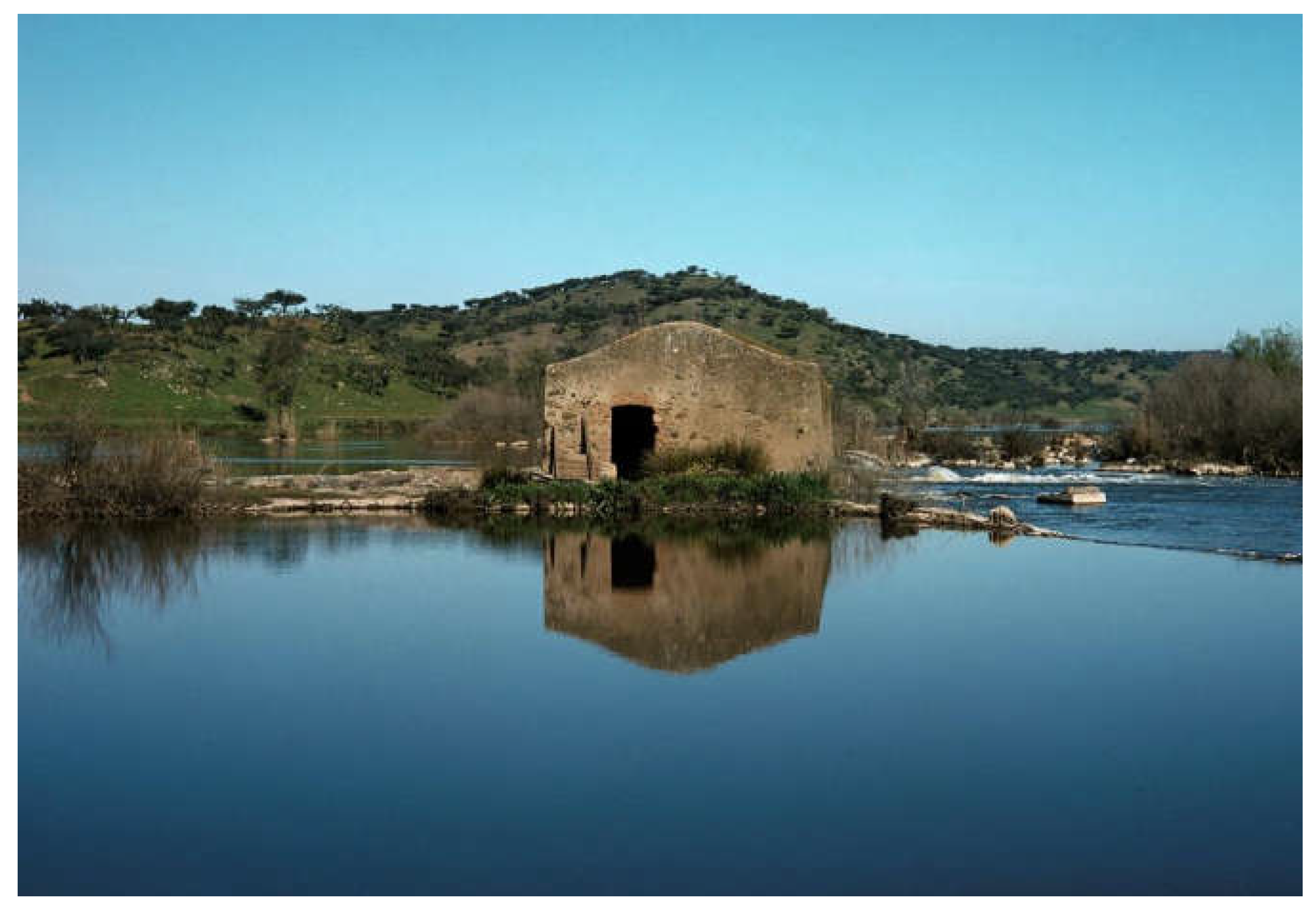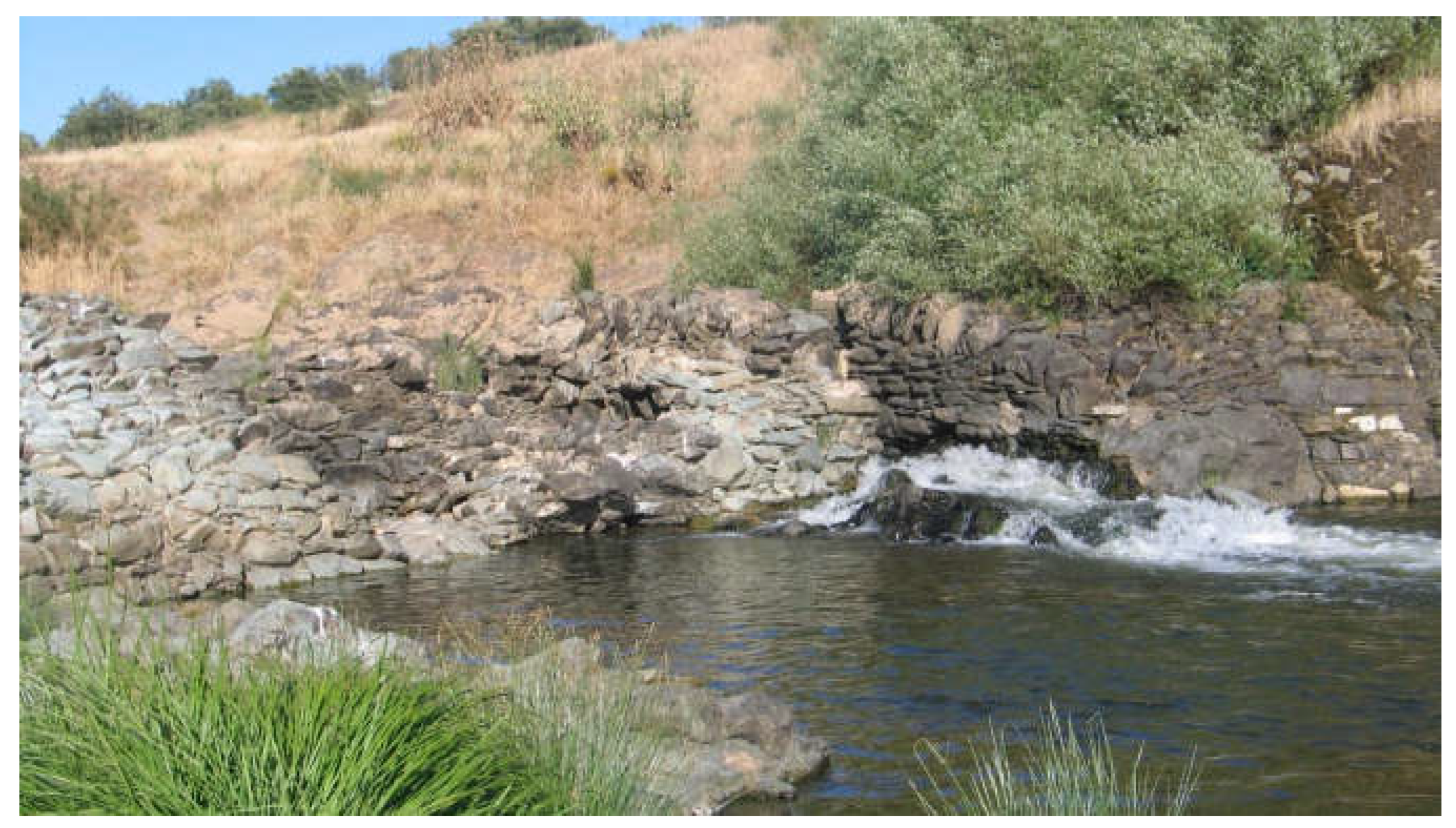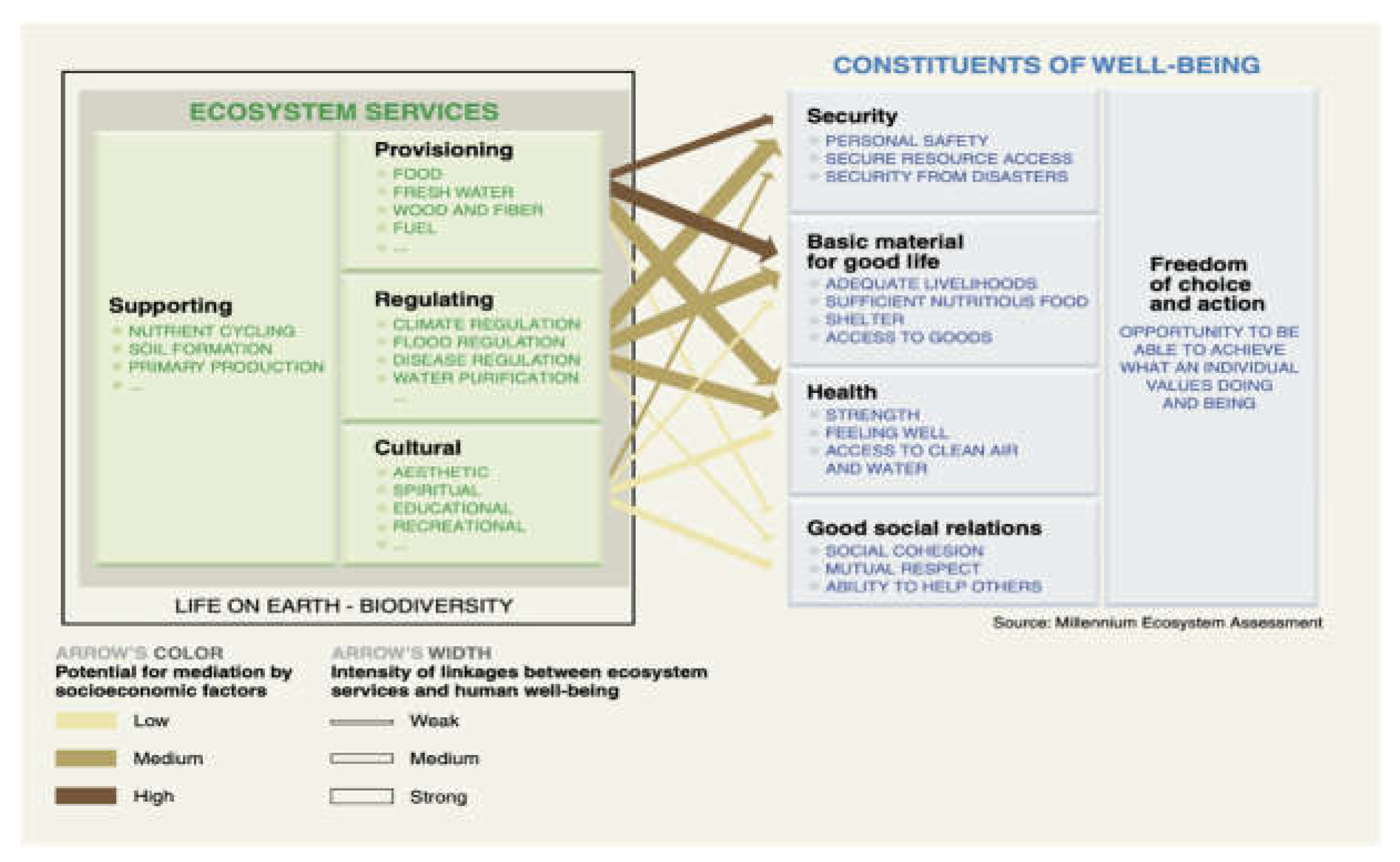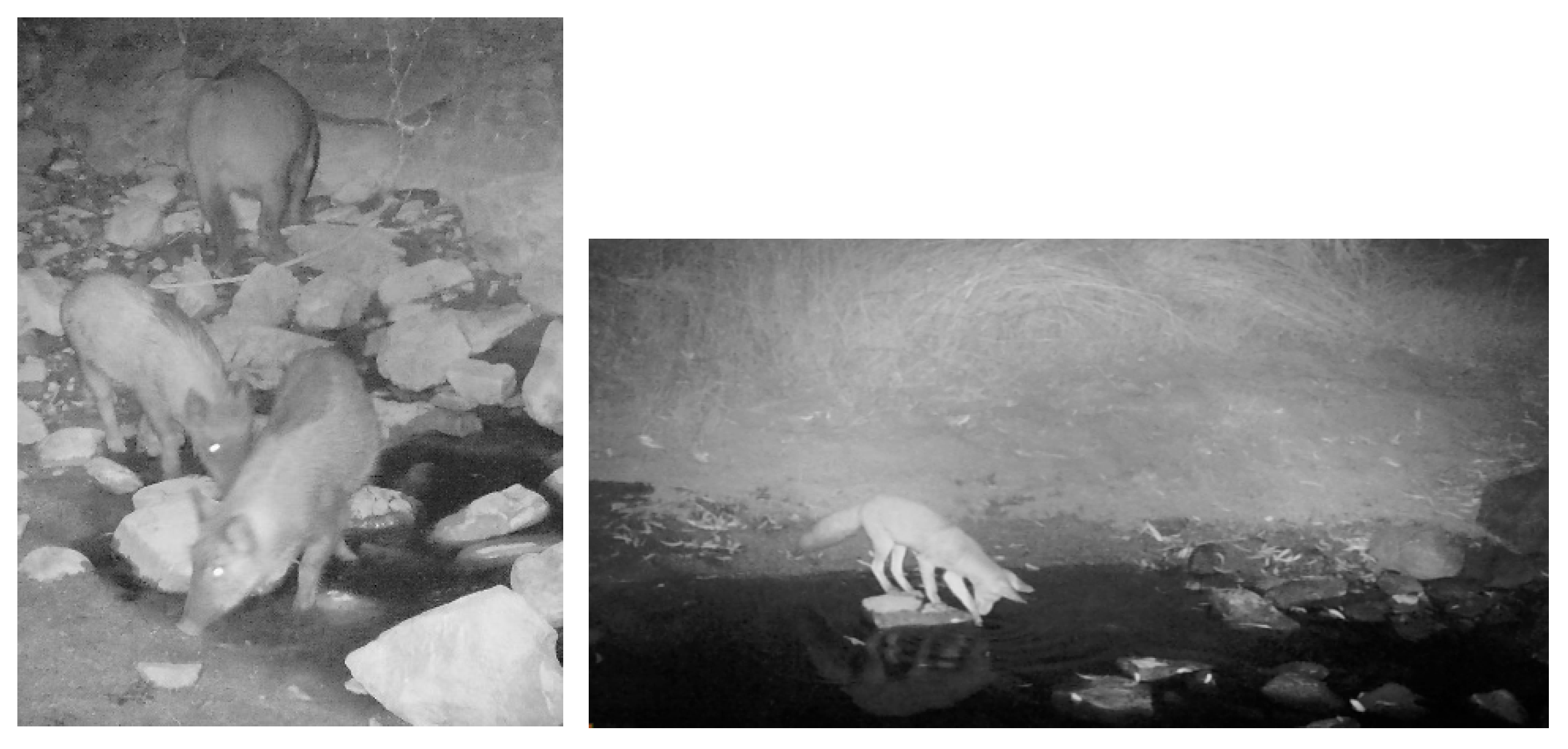1. Introduction
In recent decades freshwater scarcity has been increasingly recognized as a global systemic risk and elevated to the center of the global concern [
1]. The fact that the theme of World Water Day 2007 was “Coping with Water Scarcity” illustrates this [
2].
Although water scarcity often has its roots in water shortage, there are several ways of defining water scarcity, so it can be considered a relative concept. Scarcity can occur at any level of supply or demand because of the lack of correspondence between availability and demand, or it can be related to access or the expected water quality related to the increasing degradation of groundwater and surface water [
3]. Temporal or geographical imbalances between availability and demand are largely responsible for water scarcity [
4,
5] because these can generate conflicts between water users. The imbalance between the forcing drivers relative to demand (high population growth and economic development) on the one hand and the forcing drivers relative to availability (droughts and wide climate variability) on the other, can make this water scarcity dramatically real and acute. Thus, spatial and temporal considerations are important determinants for water scarcity, and therefore, to water security [
6]. A feature of any ‘‘desirable’’ water secure future must be the existence of healthy ecosystems, which require water to maintain the life of these ecosystems [
7].
Usually, coupled water scarcity and water availability is analyzed considering surface water, because surface fresh water is the most readily available resource to meet water demands, and thus, is considered the first indicative of blue water availability [
8]. Nevertheless, considering a systemic view of water (its whole cycle and flows), it is necessary to consider the interdependence between blue and green water, and how the entire landscape can help to produce and maintain water [
9]. The ecological concepts of sources, sinks, and recycling can help to provide a useful understanding of water basins, water cycles and flows [
10]. When considering the systemic view, applied not only for the elements in a structural perspective of landscapes [
11] but for the entire process and feedback controls, we can see not only that healthy ecosystems need water but also that healthy ecosystems can produce water [
12]. In other words, water should absolutely be considered connected to the landscape where it runs, and the way to recover water should rely on nature-based solutions [
13,
14,
15].
This paper reflects on the role of ecosystems in water production and conservation and how this systemic approach for water conservation can be improved by analyzing past experiences as supportive lessons similar to the way ancient urban facilities could inspire us to harvest water in cities in water scarce regions [
16]. Examples from different areas of the world illustrate the long existence of what are presently named “nature-based solutions” (NbS).
2. The Nature-Based Solutions and Water Security
Nature-based Solutions (NbS) are defined as “actions to protect, sustainably manage and restore natural or modified ecosystems that address societal challenges effectively and adaptively, simultaneously providing human well-being and biodiversity benefits” [
17]. The NbS concept aims to highlight positive outcomes for society (so-called ‘solutions’) as a gift offered or promoted by nature if we consider and respect its flows and chains. It may present some overlap with other concepts used to propose ecosystem management for societal benefit, such as Ecological Engineering, Green/Blue Infrastructure, Ecosystem Approach, Ecosystem-based Adaptation/Mitigation, Ecosystem Services Approach or Natural Capital [
18]. NbS can be an important strategy to increase water security supported by a systemic approach that considers water security as “the capacity of a population to safeguard sustainable access to adequate quantities of acceptable quality water for sustaining livelihoods, human well-being, and socio-economic development, ensuring protection against waterborne pollution and water-related disasters, and preserving ecosystems in a climate of peace and political stability” [
19]. Stable ecosystems can reduce uncertainty, enhance overall water security by improving both water availability and quality, prevent water-related disasters, and achieve increased water body’s resilience for climate change [
20].
Vegetation-water interdependencies should be considered because vegetation influences water recycling from local to continental scales. Within this coupled system, tropical trees extract deep soil water and pump it into the atmosphere, circulating water through evapotranspiration to precipitation processes [
21]. Vegetation should be regarded as a water ‘recycler’ [
20], illustrating the interdependence between green and blue water [
9].
NbS can offer the main or only viable solution in each particular context, facing challenges that gray infrastructure cannot address (due to aging or inadequacies with respect to climate change). For example, the third Rhone River Correction Project in Canton of Valais, Switzerland, aims to return space to the floodplain that had been eliminated. After recognizing that the past interventions in that river were incapable of flood and disaster prevention, authorities decided to widen the river corridor, creating additional space for the river to improve the landscape and biological diversity and restore the ecological functions of the river and the natural dynamics of the ecosystem as much as possible [
22]. NbS can thus represent innovative solutions within Principles and Practice of integrated Water Resources Management (IWRM) by embedding ecosystem services approach, leading to water resilience, and improving livelihood people’s welfare.
The following sections describe three cases of NbS implementation from Brazil, Panama, and Portugal. Subsequently, we comment on what these experiences can teach us today as we aim for a sustainable future where ecosystem services can be fully provided under an ecocentric framework.
3. Some Nature-Based Solution Case Studies
3.1. The Forest Landscape Restoration in Tijuca Tropical Rain Forest, Brazil
“Rio de Janeiro’s Carioca Landscapes between the Mountain and the Sea (Brazil)” was inscribed on UNESCO’s World Heritage List in 2012. According to UNESCO’s Decision 36 COM 8B.42, an outstanding contributing factors was that “
the mountains and open green areas of the Tijuca National Park, together with Corcovado and the hills around the Guanabara Bay still retain a similar combination of forest and open observation points as at the time of colonization and allow access to vistas of the city from many high vantage points that demonstrate very clearly the extraordinary fusion between culture and nature in the way the city has developed”. The Tijuca Forest, the core landscape of this set that impressed UNESCO, remains less than twenty kilometers from the city center, occupying a large area of land on the southern slopes of the Tijuca and Papagaio peaks encompassing the Alto da Boa Vista, and the Pedra do Conde [
23].
Presently, the Tijuca Forest belongs to a protected area, the Tijuca National Park, with a total of 39.51 km
2 of Atlantic Forest biome containing a rich biodiversity, including several endangered species (
Figure 1). The mountainous and rugged terrain includes Pico da Tijuca, Corcovado, and Pedra da Gávea, the latest, considered the largest seaside monolith in the world. The Park presents a unique natural beauty, contrasting the green of the forest with the ancient rocky surfaces and the sea. The rocks that form the mountains of Tijuca National Park age around 1.7 billion years. The Park’s climate, due to the geographic orientation of the Tijuca Massif, presents abundant rainfall, with no dry period in winter. Sites located up to 500 meters high have a tropical climate, while above this altitude, temperate conditions occur. The hydrography of Tijuca National Park is quite extensive with several streams (Maracanã, Carioca, Cachoeira, das Almas, among others). Several waterfalls are also present, the most famous, the Cascatinha Taunay.
Today´s impressive landscape resulted from an enormous effort to restore the tropical rainforest. In fact, the Tijuca Forest is a replanted tropical forest as the result of pioneering reforestation experiences with native species and forest and watershed management. The forest remained intact throughout almost the entire 18th Century, as land squatters that supplied the city with food were restricted to the edge of the urban area on land where the new city would later emerge. The location preferences of peasants probably were guided by the abundance of water for food production.
In the second half of the 18th Century, coffee plantations emerged in Rio de Janeiro and quickly spread around the hills surrounding the city due to favorable local climate conditions and soil. However, by the beginning of the 19th Century the abandoned coffee farms and eroded slopes resulted in severe environmental degradation. The second quarter of the 19th Century (particularly 1824, 1829, 1833, and 1844) experienced severe droughts in the empire´s capital, and the provision of drinking water was seriously threatened.
The King of Portugal still living in Brazil (Dom João VI) immediately issued orders to (1) stop the forest devastation in the springs near the city; (2) plant trees next to the springs of some rivers; and (3) carry out assessments allowing the government to expropriate areas with springs and place them under protection. The King was cognizant of the relationship between land use and water availability, as well as the importance of vegetation to produce a continuous supply of water. Protection and restoration of the forests has been associated with the problem of water supply since the governmental period of Dom João VI, and this issue remained a constant in ministerial reports from the 1830s onwards [
24].
It took more than ten years for the government to implement appropriate land purchases, and several more to initiate forest management practices. From 1862 to 1874, Major Manuel Gomes Archer, the designated forest manager, implemented an extensive reforestation process working personally with some few slaves, following the following criteria: prioritize some slopes more threatened by erosion; employ seedlings, in opposition to seeds or already grown young trees; and use apparently random combinations of species, based on personal knowledge of the distribution and incidence of the species in the region’s original forests [
25]. During this 13 year period, over 100,000 trees were planted [
23]. After Major Archer, Baron d’Escragnolle continued reforestation and additionally began landscaping work for beautification purposes aimed at public use and contemplation. Under the coordination of renowned French landscaper Auguste Glaziou, the forest received corners, leisure areas, fountains, and lakes.
In the 19th Century, capturing water from the Tijuca National Park became a strategic activity that was essential for supplying the city´s water supply. At the end of that century, a complete network of small dams was established, capturing water from several rivers in the Park. After many years of relative abandonment, the 1940s saw a revitalization of the Tijuca Forest, under the leadership of Raymundo Ottoni de Castro Maya with the opening of restaurants, the consolidation of internal roads and landscape projects by Roberto Burle Marx.
Finally, in 1961, the area of the Tijuca Massif gained the status of protected area under the name of the Rio de Janeiro National Park with 33 km2, changing its name to the present one (Tijuca National Park) on February 8, 1967. On July 4, 2004, a Federal Decree expanded the Park’s limits to the present extension of 39.51 km², incorporating locations such as Parque Lage, Serra dos Pretos Forros, and Morro da Covanca. Today Tijuca National Park is considered the largest urban park in the world and leads park visits in Brazil (more than 4 million visitors in 2023).
The success of reforestation activities in the past led to the present UNESCO’s recognition of landscape value. Besides the original central target ecosystem service of water security, the entire ecosystem has benefited, supporting today´s high biodiversity and offering social opportunities of leisure and climate regulation for residents. This example shows how a NbS can jointly deliver a group of ecosystem services even when it initially targeted only one.
3.2. Panama Canal Watershed
The 82 km long Panama Canal is one of the world´s major shipping routes. Approximately 4% of global maritime trade (about 14,000 transits annually) passes through the Canal with primary routes to and from East Asia and the East Coast USA, as well as Europe to East Asia and the West Coast of the Americas. The Canal also contributes about US$2.5 billion annually to the Panamanian treasury or about 3% of the nation´s GDP. The Panama Canal Authority (ACP) (referred to today simply as “Canal de Panamá”) operates the Canal, governed by its organic law which guarantees a significant degree of autonomy by the National Constitution and requires that the ACP lead the coordination with other institutions with sectoral authority in the Canal area. The Canal operates with a series of locks that raise and lower vessels from the ocean to freshwater Lake Gatun created by damming the Chagres River over a century ago. Ocean-going vessels travel 33 km through Lake Gatun before being lowered to the other ocean through another series of locks. In 1935 an additional dam was constructed upstream on the Chagres River to provide additional water security for Canal operations – resulting in the formation of Lake Alajuela.
After more than a century of operations with the original locks, in 2016 the ACP completed a major project that constructed wider locks handling larger NeoPanamax vessels. Unlike the original locks that release some 200 million liters of water to the ocean during each transit, the new locks incorporate water reuse chambers resulting in less water per transit. This feature is important because climate change predictions for Panama suggest that precipitation may decrease about 10% over current values in coming decades [
26,
27]. The Canal Watershed has experienced significant droughts in recent years (partially explained by strong El Niño events predicted to be more extreme with climate change) that have led the ACP to reduce transits by one third in 2023-24 [
28]. The 2023 season was the third driest in the history of the Canal Watershed with 30% less precipitation than expected, and as a result, the Canal´s reservoirs only could store about half of the normal water volume [
29]. Normally, some 36-39 vessels transit the Canal daily. However, in 2023, the ACP was forced to reduce daily transits to 22 [
30]. Low water flows during the 5-month dry season (January to May) compounded with strong El Niño events in 1982-83 and 1997-98 also resulted in major decreases in Canal transits.
Additionally, Lake Gatun and Lake Alajuela are also the source of drinking water for about 2 million residents of Panama City and Colon (about half of the country´s population). The lower water levels in the Canal reservoirs resulted in decreased supplies of potable water to metropolitan areas in 2023-24 [
31]. Added to the decrease in precipitation in the Canal watershed from climate change, the increasing water demands from growing urban populations and the land use changes resulting from the deforestation of the Canal´s watershed have increased the vulnerability of future operations of the Canal.
The Panamanian Government´s policy until the 1980´s promoted the “conquest of the jungle” and encouraged small farmers to colonize forested lands and convert them to pasture for cattle ranching and cultivation of crops [
32]. Wadsworth [
33] compared maps from 1952 and 1978 and concluded that during this period about 30% of the watershed had been deforested. Other studies note that between 1974 and 1991 the Canal Watershed lost about 43% of its forests to urbanization, cattle ranching, and crop cultivation [
34,
35]. Constructed and administered by the United States, the Panama Canal and the colonial Canal Zone began a period of gradual transition to Panamanian control with the signing of the Panama Canal Treaties in 1976 resulting in complete Panamanian administration at the close of the century. During this transition period, the binational Canal administration increasingly recognized the importance of protection of the watershed of the Chagres River to guarantee the water supply for Canal operations. A new environmental ethic based on the importance of Canal operations developed during the administrative transition of the Canal. Perspectives of scientists, Canal administrators, environmentalists, and politicians coalesced around recognition of the importance of the Canal´s watershed and green forest infrastructure that provided water for the Canal´s operations [
32]. Additional concerns focused on the increased sedimentation in the two lakes caused by erosion of deforested lands in the watershed. To this end, Panama created Chagres National Park in 1984 to protect the upper watershed of the Chagres River, and the efforts of today´s ACP and the Ministry of the Environment have significantly reduced deforestation within the park boundaries. At the same time, creation of the national park created adverse impacts on the thousands of small farmers who live inside the boundaries of the protected area and are limited in the land that they can farm using shifting agricultural techniques.
Passage of Law 19 in 1997 that created the Panama Canal Authority increased efforts to protect the watershed. The ACP adopted its regulation (Agreement 116) formalizing its environmental and watershed management responsibilities [
36]. The formal Canal Watershed, as defined by the ACP, consists of 343,521 ha covering 7 political districts or about 4.5% of national territory. Some 127,326 ha lie on the western side of the Canal (37.08% of the watershed). Much of the land on the Canal´s western flank has been deforested and today is grassland for cattle ranching. Three national parks (Chagres, Soberanía, Camino de Cruces) account for much of the land on the 216,195 ha on the eastern side of the Canal, and indeed, some two thirds of the forested lands in the watershed [
37]. Although urbanization and agricultural expansion have accounted for land conversion on the eastern side of the Canal, the land degradation is more extreme on the western portion of the Canal´s watershed.
Recognizing the importance of wise land use on the watershed, the ACP has embarked on significant efforts during the past 20 years – particularly in the lands on the western bank of the Canal that have seen 75% of ACP´s investment in reforestation and sustainable agricultural activities (Martinez, R., personal communication, June 10, 2024). One of the initial incentives to promote both environmental and social sustainability was a cooperative program of the ACP and ANATI (National Land Titling Authority) to survey land holdings and grant land titles to small farmers. Formal titles created legal security for small farmers and set the foundation for further support from the ACP. By 2023, more than 10,000 land titles had been registered largely in Capira District in the western portion of the Canal´s watershed [
28]. The ACP has created six watershed committees and 26 local committees of locally elected members to facilitate ACP watershed management efforts and convey community needs and concerns to the ACP [
28].
ACP´s efforts have been channeled through its Program of Environmental Economic Incentives (PIEA) that began in 2010 with the aim of fostering sustainable land uses and forest protection, thus providing water resources for Canal operations and drinking water for half of Panama´s population. Interventions in rural areas, described below, improve environmental conditions and livelihoods of rural residents, income for families, and employment. PIEA activities have been concentrated in the watersheds of the Cirí-Trinidad Rivers in the extreme western area of the Canal Watershed.
Reforestation for conservation and commercial purposes is one major PIEA project. Establishing vegetative protective cover helps increase dry season water flows into Lake Gatun and avoids sedimentation of the lake reservoirs and associated dredging costs [
38,
39]. By the end of 2021 over 3,000 ha had been reforested with the planting of 790,000 trees. Over 1,200 small and medium-sized agricultural producers have benefited in Capira, Colón, and La Chorrera Districts. These benefits include shade for crops, wind breaks, soil improvement, water conservation (quantity and quality) – increased water infiltration and reduction of erosion and sedimentation, carbon fixation, and support for biodiversity. The ACP also utilizes Payments for Environmental Services (PES) as incentives to maintain existing forested lands in the Canal watershed. ACP approved regulations formalizing PES application in 2018 [
40]. By 2023, over 400 private owners of some 5,150 ha of existing forested lands have received financial benefits (about
$100/ha/yr) under this program [
28,
41].
PIEA has generated significant support for agroforestry projects – including planting of coffee, cacao, and fruit trees. ACP supported the creation in 2012 of the Asociación de Productores de Café de la Subcuenca de Ríos Cirí Grande y Trinidad (ACACPA) to support sustainable and environmentally-friendly production and commercialization of coffee [
42]. Shade-grown coffee farms have replaced deforested lands used for cattle ranching (
Figure 2 and
Figure 3). ACP incentives include support for plantation establishment and payment for farmers´ work for the initial year; provision of materials, tools, and fertilizer; technical support for an additional two years as the coffee farms become sustainable. ACACPA´s 90 members successfully planted some 4,000 ha of shade-grown, organic robusta coffee by the end of 2021. Panama´s Ministry of Commerce and Industry recognized the trademark of “Cuencafé” in 2018, and today, it is sold whole-bean or ground.
Additional PIEA efforts focus on improved agricultural practices to reduce soil erosion (and sedimentation of the Canal´s reservoirs), increase yields, and improve farmers´ livelihoods. Interventions include promotion of improved grasses for pasture, planting of riparian buffers, living fences, planting of trees in pastures, cattle crossings of streams to avoid erosion, crop rotation, and organic fertilizers.
The ACP recognizes the close relationship between wise land use in the Canal´s watershed to guarantee sustainable flows of water for Canal operations and provision of potable water for half of Panama´s population while simultaneously supporting the livelihoods of thousands of small farmers who reside in the Canal Watershed. Will the ACP´s impressive efforts be sufficient to guarantee sufficient water for these multiple needs in the future? Additional areas of action must include water conservation measures by all users, a revision of water pricing, repair and updating of potable water infrastructure to minimize water losses, as well as increased reforestation of the Canal Watershed. Current discussion surrounds the possible extension of the Canal´s legal watershed to the west with diversion of water from the Río Indio or to the east with transfer of water from the reservoir of the Bayano River [
43,
44]. We believe that reforestation efforts in the existing Canal watershed should be prioritized and enhanced before diverting water from adjacent watersheds that would lead to significant adverse social and environmental impacts.
3.3. The Ancient Weirs in Riverbeds - Alentejo Region, Southern Portugal
The Alentejo is Portugal’s largest region. However, despite occupying around 1/3 of the national territory (31,551 km
2), it is characterized by an aging and poorly qualified population, with low capacity to attract young people; its Gross Domestic Product (GDP) per capita, is below the national average. This region has the highest rate of desertification and the lowest population density in Portugal (5% of national population) [
45].
Historically, the main sector of economic activity in Alentejo has been extensive agriculture and livestock farming - well adapted to climatic and environmental conditions. [
45,
46]. The rural population is traditionally linked to the valorization of the natural heritage in a territory with high biodiversity and many endemic species of conservation interest. However, today the structure of this territory is potentially threatened by increasing changes in land use, with progressive replacement of traditional extensive agriculture by intensive irrigated agriculture [
47,
48]. This production model has emerged on a large scale after the 2002 construction of Alqueva Dam, mainly due to a long-standing public investment in the Alqueva irrigation system [
48]. The project, with a long history (the first Alentejo Irrigation Plan dates from 1957) was designed to supply water to the Portugal´s driest region, most prone to water scarcity and physical and human desertification processes [
49,
50].
The Alentejo’s typical Mediterranean climate is characterized by warm and dry summers and cool and wet winters. The mean annual air temperature is around 18
o C., and the mean annual precipitation is around 900 mm with a strong north–south gradient, reaching values below 500 mm in the southeastern part of the region [
51]. Thus, river flow regime is intermittent, with torrential flows in winter and interruptions in summer, with long dry reaches, even on the main international Guadiana River (regulated since 2002 due to the construction of the Alqueva Dam system) [
52].
In the past, the rural population, uneducated and impoverished, adapted the agricultural production model to the cycles of nature, taking advantage of natural resources and finding natural solutions [
47]. An example of these practices are the water mills located on the banks of the Guadiana River and its tributaries, to produce flour from different cereals (
Figure 4). The existence of water mills dates to at least the 13th Century [
53]. However, in the 19th Century the number of mills reached its peak, due to the increasing population, and continuing into the 20th Century as a natural mode of production for large plantations [
54,
55].
In 2002, during the construction of the Alqueva Dam, around a hundred mills of different shapes and sizes were identified, built in such a way that their architectural structure was not damaged when the flow rose (i.e., during winter after flood events) and submerged the structure for periods of up to four months [
55]. In very rainy years, when the water level remained very high, preventing the mill from operating on the main river (i.e., the Guadiana River), millers would search for similar structures on adjacent tributaries with less water flow, where they would remain until the water level dropped in the Guadiana.
Guita [
55] identified 80 mills in an area of 1279 km
2 on the Guadiana and its tributaries, the smallest with drainage basins of 15 to 20 km
2. In the municipality of Mértola, he noted that one mill existed for every 16 km
2 of surface area. Mill activity remained active until the 1960s, when more than 30 mills were in operation. The five remaining mills operating in the 1980s closed before 1990.
These structures were kept in operation by weirs built in the riverbed with diversions that channeled water where it was needed to grind grains. On the Guadiana River and its tributaries, the dams were made of stones, fitted perpendicularly to the flow of water, with the thickest section facing the outside of the construction, forming an arch closed at the top by slabs [
55] (
Figure 5). These technologically simple but very resistant structures, designed by master craftsmen, demonstrate knowledge of hydraulic engineering that is remarkable for its simplicity having withstood the passage of centuries.
The mills, often built in pristine river sites, had the disadvantage of being relatively isolated and distant from the population centers. The grain was usually transported to the mills on donkeys or in animal-drawn carts, and there were even laborers who provided this service in exchange for payment, which varied between 5 and 10% of the volume transported [
55].
Farmers lived in villages near the mills [
54,
55], and they would wait until the flour was made (for one or more days) or return a few days later. The mills were also spaces for socializing, with the usual presence of customers, washerwomen, and fishermen. The men who worked in these mills were specialized craftsmen who generally held important positions in the social and economic structure of the region, due to the importance and profitability of their trade [
54]. Millers were divided into “masters” and “apprentices”. The apprentice became a master once he had mastered all aspects of the mill and milling operations (including knowledge of the river flow cycle), which under normal circumstances occurred between the ages of 16 and 19.
Abandonment of the mills and weirs was due to several factors, including the substantial reduction of bread baked in farmhouses, as a result of the mechanization of agriculture [
54]. Also decisive in this process were the migratory flows of the rural population towards the industrialized centers of Portugal and Europe in the 1960s. Additional factors were 1) the transformation of people’s eating habits, in which bread lost its value; 2) the lack of able men to work as millers; 3) the colonial war between Portugal and its African countries in the 1960s, which lasted until April 1974, with young people being recruited all over the country; and 4) the competition from milling factories and the increased production and widespread consumption of industrialized bread [
46,
54]. Generally, it was precisely these reasons that led to the deactivation of traditional milling systems in Portugal and other European countries.
4. Discussion
The three case studies briefly described above illustrate how ecosystem balance is delicate and that human interventions in supporting natural processes can effectively enhance ecosystem services. Although the cases vary in time, space, and scale we can distill several important lessons from their experiences that can offer useful information in other restoration scenarios.
The cases are illustrative of compliance with global agreements and policy goals. All are fully aligned with the 2030 Agenda for Sustainable Development (AfSD), with its Sustainable Development Goals (SDGs) and its Target 6.6 (“By 2020, protect and restore water-related ecosystems, including mountains, forests, wetlands, rivers, aquifers and lakes”) to support the achievement of the goal to ensure availability of water for all (SDG 6). Additionally, they exemplify the recent United Nations General Assembly recognition of the importance of the ecosystem approach for the integrated management of land, water, and living resources to face water scarcity when it approved the United Nations Decade on Ecosystem Restoration (2021–2030). The UNGA´s A/RES/73/284 Resolution asserts that Member States should “foster political will, the mobilization of resources, capacity-building, scientific research and cooperation and momentum for ecosystem restoration at the global, regional, national and local levels, as appropriate” and “to mainstream ecosystem restoration into policies and plans to address current national development priorities and challenges due to the degradation of marine and terrestrial ecosystems, biodiversity loss and climate change vulnerability, thereby creating opportunities for ecosystems to increase their adaptive capacity and opportunities to maintain and improve livelihoods for all”.
The Brazil and Panama cases highlight the important benefits, particularly of water provisioning, resulting from restoration and protection of tropical rainforests. Deforestation of the Tijuca Rainforest adjacent to Rio de Janeiro about two centuries ago caused severe soil erosion and diminished water supply for this important city in the Portuguese colony. The King understood the relationship between a sustainable water supply and wise forest management, protection of vegetation near springs, and reforestation. As a result of these farsighted decisions, the Tijuca Rainforest (now a remnant of the endangered Mata Atlântica) has gained national protection as Tijuca National Park and international recognition as a UNESCO World Heritage Site of cultural importance. Several centuries later in Panama in the 1970s, administrators of the Panama Canal became aware that the increasing deforestation in the Canal watershed threatened the operations of the Canal, particularly during the 5-month dry season. To protect the forest and its contribution of freshwater, the country designated several national parks on the eastern bank of the Canal that strictly limited further forest clearing. During the past decade Canal authorities have dedicated significant efforts to support forest protection on the western side of the Canal in areas with many small farms. These efforts include reforestation projects, payments to farmers to protect existing forests, and support for the cultivation of shade-grown coffee on lands that were previously pasture. The Panama experience is recent compared to the Brazilian case, yet results to date are positive.
The interdependence between ecosystem restoration and water, particularly in tropical forest ecosystems is clear. Forested headwater regions and also their protected springs are considered critical in sustaining water provision because they control flows within a catchment basin/watershed [
56,
57]. The role of forests in water provision and regulation was recognized and attributed to several categories of ecosystem services: provisioning services (freshwater provision) and regulating services (flood regulation and water purification, among others) [
58] as can be seen in
Figure 6. These functions are a consequence of interactions between ecological processes and ecosystem structures [
59]. According to Bonell [
60], forest soils have many macropores associated with the high density of roots and soil fauna activity which facilitate infiltration and the vertical by-passing of the unsaturated matrix to reach the saturated zone more quickly. These characteristics help forests both to regulate and provide water for the catchment basin.
All three cases illustrate that while there may have been a sole principal objective of the NbS activity, multiple benefits commonly result. The pioneering restoration experiences with native species in the Tijuca Forest aimed to solve the problem of water supply to Rio de Janeiro. However, in the 20th Century restaurants opened and landscaping projects were implemented in the protected forest. Today Tijuca National Park is an important site for tourism and public recreation. As a UNESCO World Heritage Site and Biosphere Reserve, the site is recognized for its spectacular cultural landscape and high biodiversity in the endangered Atlantic Forest. As an urban forest, Tijuca also serves as an important climate regulator and helps reduce air pollution. Likewise, in recent times protection of the forests surrounding the Panama Canal had a primary purpose of provision of a sustainable water supply for Canal operations. Nevertheless, today the forests are also important for providing potable water for half of Panama´s population, and also generating electricity. The national parks in the watershed are also biodiversity hotspots, important links in the Mesoamerican Biological Corridor, and sites for ecotourism. Other efforts in the watershed assist small farmers to adopt sustainable agricultural techniques and improve their livelihoods. Thus, the ecosystem and social benefits from forest protection are multiple. Similarly, in Portugal´s Alentejo Region windmills and weirs on streams historically served to mill grains. While windmills have been abandoned, today weirs help to moderate stream flow and retain water, particularly during dry seasons; attract wildlife; and are sites where people can recreate. All these examples illustrate that while NbS may initially focus on one ecosystem service, it can benefit a broad array of ecosystem services that also benefit local communities. A key feature of NbS is the capability to deliver groups of ecosystem services together – even if only one was originally targeted by the intervention [
20]. Moreover, ecosystem services (as a concept
per se detached and distinguished from economic fields such as valuation or privatization) link societal and environmental systems [
61].
NbS are well-suited to address different variables of climate change (increased temperatures, changes in annual precipitation, extended dry days, heavier rainfall). Climate scenarios for the Panama Canal Watershed and the Alentejo Region in Portugal suggest futures of diminished annual rainfall, and all three sites are projected to experience extended periods of consecutive dry days [
62,
63]. Dereczynski et al. [
63] predict longer dry seasons, shorter wet seasons, and increased rainfall during heavy rain events in the Tijuca Forest. Similar scenarios are predicted for Panama and Central America [
64]. Forest protections in Tijuca Forest and the Panama help to maintain water flows in streams during dry periods and mitigate rapid runoff carrying high sediment loads during heavy rain events. Additionally, reforestation and protection of existing forests serve as carbon sinks and help mitigate climate change.
IPCC estimates [
62] that a decrease in water availability is expected in the Alentejo Region in Portugal, with huge implications for the hydrological regime of intermittent rivers. An extension of the dry season is expected, which will cause fragmentation of aquatic habitats and loss of biodiversity. Consequently, these pressures threaten the sustainability of ecosystems, the provisioning of ecosystem services and, ultimately, human well-being. More broadly for the Mediterranean region, historical records show that the frequency and intensity of droughts has increased since 1950 and that the length of the dry period without flow is extending over time [
65]. Temporary rivers with intermittent hydrological characteristics are therefore expected to cover more than 50 per cent of the global hydrographic network [
52,
66]. Currently, it will be difficult to restore the ancient mills to produce cereal flour as it was done in the past. However, the weirs and their supporting hydraulic structures to retain water, are gaining increased importance by promoting water retention during the dry season. During the Summer, these weirs, perfectly integrated into the riverbeds, are sites where aquatic and terrestrial species converge (
Figure 7 and Figure 8). Aquatic species recolonize the system from these sites after the flow restarts with the first autumn rains. Terrestrial species seek refuge in these cooler places that provide water and food. On the other hand, these hydraulic structures, many of them integrated in the Guadiana Valley National Park (
https://natural.pt/protected-areas/parque-natural-vale-guadiana?locale=en), are protected as places of leisure for local populations. These restoration actions that rescue ancestral knowledge rooted in regional culture, contribute to compliance with environmental policies, and, above all, promote biodiversity and natural heritage, by increasing: i) the water retention capacity; ii) the availability of habitats for aquatic and terrestrial species; iii) the water quality and ecosystems integrity; iv) the groundwater recharge; iv) ecosystem services also related to the promotion of the values of built heritage. In southern Portugal, within the scope of different national and European policies, of which the Water Framework Directive stands out requiring the achievement of the Good Status for all water bodies (Directive 2000/60/CE), actions that include the rehabilitation/reinforcement of ancient infrastructures (mills and dams) are a priority [
67].
NbS often tend to emphasize ecosystem benefits above benefits to communities. Both are integral components of the coupled human-natural system. The UN Resolution on the United Nations Decade on Ecosystem Restoration (2021-2030) warns that ecosystem restoration “needs to be carried out in ways that balance social, economic and environmental objectives and with the engagement of relevant stakeholders, including indigenous peoples and local communities”. While the Tijuca Forest provides a sustainable water supply for nearby urban residents and areas for recreation and cultural appreciation, the case suggests that social impacts may not always have been so positive. Due to its historical context as a Portuguese colony, and prior to the abolition of slavery, the Emperor determined priorities, targeting the well-being of the Empire’s capital (Rio de Janeiro), using slaves for reforestation. Were communities displaced by restoration efforts? In Panama, the designation of Chagres National Park in 1984 strictly limited the ability of small farmers residing within the park boundaries to clear additional land for agricultural purposes. While authorities have offered opportunities for additional livelihood activities, questions remain regarding social equity. On the other hand, Canal authorities are actively engaged in promoting sustainable agricultural techniques that reduce sedimentation and rapid runoff from streams in the watershed.
